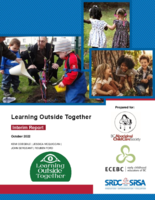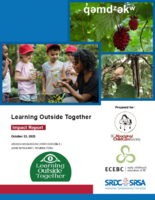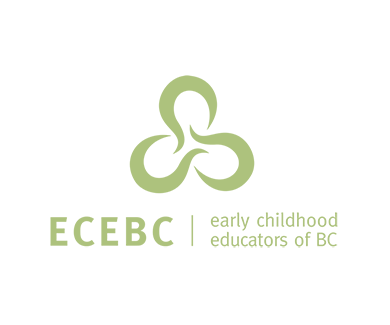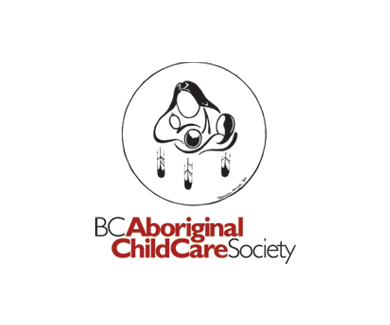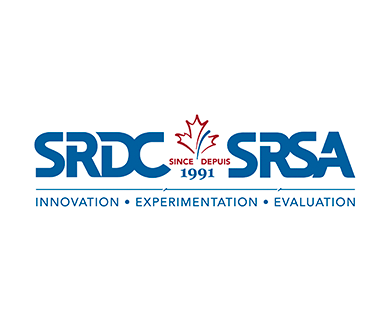LOT Program
Learning Outside Together
The Learning Outside Together course is jointly owned and administered by Early Childhood Educators of BC (ECEBC) and BC Aboriginal Child Care Society (BCACCS). The non-profit agency Social Research and Demonstration Corporation (SRDC) is an equal partner in the project supporting mentor matching, participant recruitment, and project evaluation.
LOT: Learning Outside Together, Incorporating traditional wisdom and promising practices to futureproof child care programs
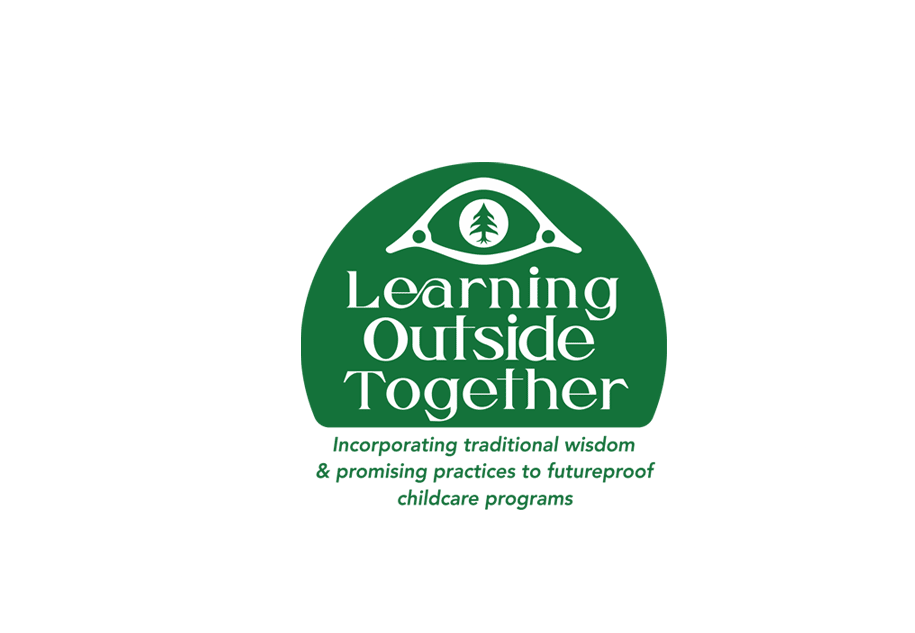
The Program
The LOT online course will take place over 19 weeks (including holidays and catch up weeks), with small groups of enthusiastic child care professionals being guided by peer mentors. Participants will develop the knowledge and skills needed to increase children’s time and meaningful experiences outdoors, including Indigenous ways of knowing, learning, and experiencing land as teacher. Participants will complete the course with a new appreciation for spending time in nature as well as a professional development certificate (up to 34 hours).
Participants will be supported through the course by peer mentors. To become a mentor, an ECE must first go through the online course as a participant, and then join the 4 week mentorship training. This model reflects the principles of a learning circle, learning with and from one another. Mentors receive a professional development certificate (8-10 hours) as well as a honorarium in appreciation of their support to the participants.
The LOT program has been developed and guided by our amazing partners and Steering Committee, including Indigenous and non-Indigenous early childhood educators, Elders, and other experts.
Both the participant and mentorship courses are both being offered free of charge. Funding has been provided through the Future Skills Centre and an anonymous donor, allowing multiple generations (groups) of ECEs to participate in this pilot project over the next three years.
Find out more on the Future Skills Centre website.
Cohort 4 Timeline
Click to view larger version.
Cohort 1
Interim Evaluation Report
Impact Report
Frequently Asked Questions
View the frequently asked questions below.
General Program Information:
The LOT program is an online professional development opportunity for Early Childhood Educators. It consists of 4 components:
- A self-paced online curriculum. There are 9 basic modules. 3 of the modules have a “part b”. The course is structured to allow participants to complete 1 of the “part b” modules, for a total of 10 modules.
- Activities, personal reflections and contribution to the group chat to deepen comprehension, completed after each of the 10 modules.
- A minimum of 10 online group meetings
- A 2 hour, optional, online graduation celebration.
It is expected that the first three components each require a minimum of 1 hour per week, for a total of 3 hours. However, registration in the LOT program does not come with a set professional development certificate. Instead, the hours each participant commits to the program are calculated as described below. Professional development certificates reflect these calculations.
The program will cover a multitude of topics that will help early childhood educators become enthusiastic and more confident about bringing their ECE practices outside.
Participants will watch videos, read, listen and reflect on:
- Indigenous traditional knowledge and wisdom
- Concepts of land as teacher
- How educators adapt their practices to the different seasons
- How to talk and work with licensing officers, managers, and parents
- Ways to improve your outdoor spaces
- How to explore alternative outdoor spaces for your program
- Sustainability practices
- Honoring the land and traditional territories
- The role of the educator
- and much much more!
Educators who have an ECE Basic certificate and are currently employed or self-employed at a child care workplace in British Columbia, in a role working directly with children.
All ECEs working in BC are welcome to apply. It doesn’t matter if you live in an urban, rural or remote setting. As long as you can access the internet! (And if you can’t please let us know, we may be able to help.) Unfortunately, we cannot currently accommodate those who live and work outside of British Columbia.
The LOT program is a partnership between ECEBC, BC Aboriginal Child Care Society, and the non-profit Social Research and Demonstration Corporation. The project partners are supported by a Steering Committee composed of experts, Elders, and passionate educators. The content for the LOT program includes interviews from 24 Indigenous and non-Indigenous people, was developed by Dr. Enid Eliot and numerous individuals provided additional feedback and insight (including our colleagues at Metis Nation BC). It took a community to develop this course and we are incredibly grateful to all those who generously provided their time, stories, wisdom, and insights.
Yes, the LOT program was designed to be completed by ECEs who are currently working. You will receive a selection of times to meet when you are applying. Please apply if one or more of the available times suit your schedule for the full 19 weeks of the program. The majority of the meetings will take place outside of 9-5 Monday to Friday to accommodate ECEs working full time. The program will take place over 10 virtual meetings and an online wrap-up celebration over 19 weeks (including holidays and catch up weeks). Please see the Cohort Timeline for more information.
Yes, you are required to apply again.
Costs, Certificates and Accessibility:
Yes, the LOT program is free right now thanks to funding from Future Skills Centre Canada and an anonymous donor.
Please consider applying and letting us know any relevant details. We should be able to help, but we need to know what you need!
We made the choice to put the program online so that we can reach as many people across the province as possible. Each week you will be asked to go outdoors (in your local area), to observe and reflect. You will then come back inside and meet with a small group online.
The contributions of each participant are tracked (module completion, activities, meetings) and totalled. Each participant’s certificate will reflect the hours they have completed.
Participants who complete 24+ hours, complete at least 7 modules and their associated activities and attend at least 7 online meetings are given a professional development certificate with their completed hours, that also states “Completion of the Learning Outside Together Course”.
The maximum number of hours that may be listed on a LOT professional development certificate is 34 hours (12 modules, 12 associated activities, 10 meetings).
Participants who attend the celebration will be given a (separate) certificate for this event.
Note: Only participants who receive their certificate of completion AND completed 10+ modules are eligible to apply to become mentors.
Timelines and Time Commitments:
The next group, Cohort 4, will start October 9th, 2023 and end with a celebration on February 12, 2024. Please see the Cohort Timeline for more information.
Yes! Please apply anyway and note this in your application. As each small group can choose a “break week”, we should be able to accommodate your schedule.
Each week there will be approximately 1 hour of self-paced learning, 1 hour of reflection outdoors or activities, and a 1-hour meeting with your mentor group. As such, a minimum 3 hour time commitment is required for each active week. Please see the Cohort Timeline for more information.
Yes. However, the weekly online and outdoor ccomponents must be completed before each small group meeting.
You will select from the available times that you can meet. The groups will be formed by availability and additional criteria.
We don't know at this time as it is dependent on funding.
After the Program & Mentoring Opportunities:
Yes. You will be in a small group with a mentor (5-7 people). As a group you can decide whether or not you want to keep in touch after the program is completed.
The mentors will be ECEs from across the province who have the skills and interest in mentoring participants and facilitating group discussions. They are your peers. Mentors will have taken the LOT participant program in previous cohorts and completed 10+ modules.
You are welcome to apply to be a mentor if you have received your certificate of completion AND completed 10+ modules.
Yes. There is a mentorship program to give ECEs the skills and knowledge to support and mentor their peers.
Mentors meet weekly during the program to ask questions and share thoughts, reflections and experiences.
Mentors will continue to meet as a group to support each other as they support the ECEs going through the 19-week LOT project. Mentors will meet weekly for the first 4 weeks of the program, and bi-weekly for the remaining weeks. Please see the Cohort Timeline for more information. Note: The 19 week time-frame includes holidays and catch up weeks.
(This means that during the active weeks of the 19-week LOT project mentors may have up to two meetings per week: one with the mentor group and one with their small group).
This project is a partnership between ECEBC, BC Aboriginal Child Care Society and the non-profit Social Research and Demonstration Corporation. The project partners are supported by a Steering Committee comprised of experts, Elders, and passionate educators. The content for the mentorship program includes interviews from Indigenous and non-Indigenous people, was developed by Liz Brown and Karolyn Hendra. Numerous individuals provided additional feedback, insight and support of Liz Williams. It took a community to develop this course and we are incredibly grateful to all those who generously provided their time, stories, wisdom, and insights.
Yes, it is free right now thanks to the funding provided by Future Skills Centre Canada and an anonymous donor.
Yes! Mentors will receive a professional development certificate for 8-10 hours as well as an honorarium.
Policies
Download the full policies document (pdf).
Calculating Hours
There are 12 online modules that make up the online curriculum (9 basic and 3 “part b”). During the LOT program, the expectation is to work through 10 modules. Participant progress can be tracked by the administrator in the group management section of the Early Learning Hub. At least 7 modules must be completed for a participant’s certificate to note “course completed” in addition to recognizing their professional development hours. 10 modules must be completed for the
participant to qualify to become a mentor. Completion of each module is calculated as 1 (one) hour of professional development to a maximum of 10 hours. Up to 2 additional hours are given should the participant complete all 12 modules.
Each module (weekly curriculum) has associated activities such as the mapping exercises, visiting outdoor spaces, reflections and contributions to the online group chat. Adding photos and reflections into the group discussion is an integral component of this section.
Completion of each week’s activities is calculated as 1 (one) hour of professional development to a maximum of 12 hours, should all 12 modules be completed.
Participants are on the honour system for these activities and reflections. If there are concerns that a participant has not done the weekly activities, mentors should first bring this up with participants. If the participants cannot demonstrate the completion of the activities, they will not be credited for these hours.
There are a minimum of 10 online group meetings scheduled over the course of the LOT program. It is expected that participants attend all meetings. At least 7 meetings must be attended for a participant’s certificate to note “course completed” in addition to recognizing their professional development hours and for the participant to qualify to become a mentor.
Attending and contributing at 1 (one) meeting is measured as 1 (one) hour of professional development, to a maximum of 10 hours.
Should a participant not be able to attend a meeting, it is up to the participant to demonstrate an equivalent effort – by posting their insights into the discussion feed, meeting with the mentor one to one, or by another means. The mentor has the discretion to acknowledge and track one hour for this effort.
Should the mentor cancel a meeting and either not schedule a replacement meeting or the replacement meeting is at a time the participant cannot attend, the participants will not be penalized for this situation. As a replacement, participants can provide their reflection and comments for the week in the group discussion to receive the professional development hours associated with that meeting.
A two hour graduation celebration will be held via Zoom. Attendance is optional but encouraged. Attendance will be tracked and credited as professional development credits (up to 2 hours).
The contributions of each participant are tracked (module completion, activities, meetings) and totalled. Each participant’s certificate will reflect the hours they have completed.
Participants who complete 24+ hours, complete at least 7 modules and their associated activities and attend at least 7 online meetings are given a professional development certificate with their completed hours, that also states “Completion of the Learning Outside Together Course”.
The maximum number of hours that may be listed on a LOT professional development certificate is 34 hours (12 modules, 12 associated activities, 10 meetings).
Participants who attend the celebration will be given a (separate) certificate for this event.
Note: Only participants who receive their certificate of completion AND completed 10+ modules are eligible to apply to become mentors.
Professional Development Certificate Production Process
Each mentor will submit to the LOT administration
- a list of their participants
- the weekly meeting attendance record
- any approved activities in lieu of weekly meeting attendance
- any agreed upon reductions for incomplete weekly activities
ECEBC will gather that information from the mentors as well as the Early Learning Hub and the Zoom Celebration records.
ECEBC will notify each participant within three weeks of the final celebration, via email, with the total hours that have been tabulated. If a participant believes there has been an error, they should notify ECEBC within a week.
ECEBC will issue the Professional Development certificates within three weeks of the final celebration.
Appeals
ECEBC and BCACCS strive to create professional development certificates that are a fair representation of the effort participants commit to the LOT course. Both agencies recognize that from time to time, participants may dispute the professional development hours that have been calculated.
If a LOT participant wishes to dispute the professional development hours tabulation, (s)he will have ten (10) business days from the date of the email notifying him/her of the tabulated hours to launch an appeal. The process will be as follows:
- The participant will submit a claim to the Executive Director of ECEBC at appeals@ecebc.ca stating their view of why the decision is unjust and providing any additional information to support their appeal. The subject line must say “LOT Program”
- The Executive Director will respond within ten (10) business days of receiving the appeal letter. (S)he will consult with the participant’s mentor, the LOT administrators and/or the Early Learning Hub administrators and bring this information to the partners (ECEBC, SRDC, BCACCS). Together, the partners will make a decision.
- The Partners’ decision will be considered final, with no further avenues for appeal.
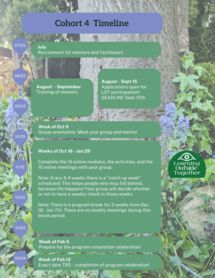 LOT Cohort 4 Timeline
LOT Cohort 4 Timeline 